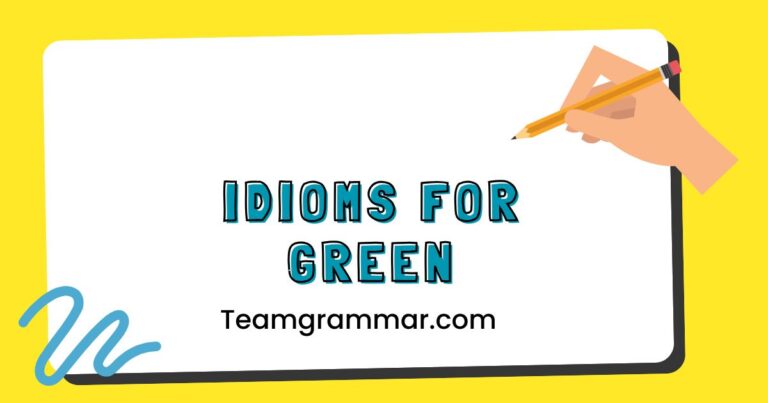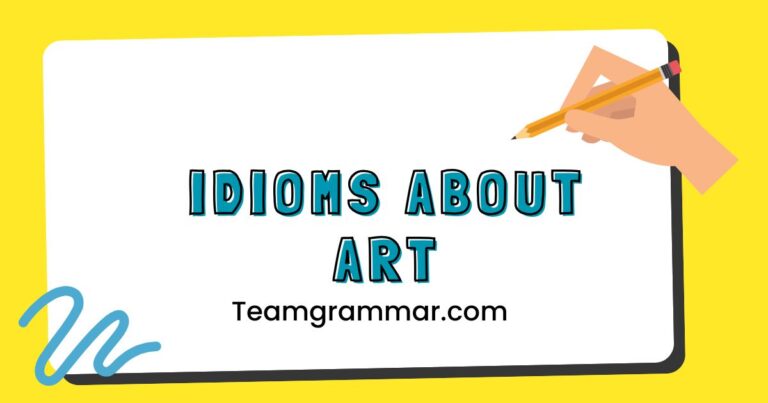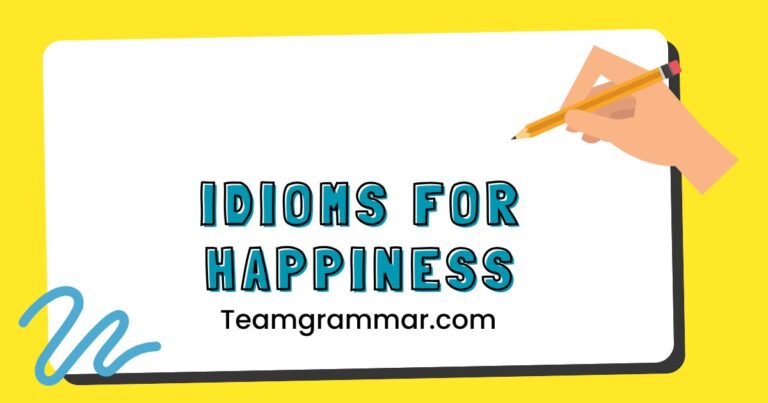37 Idioms About Studying: Mastering Academic English
Understanding idioms is crucial for mastering English, especially in academic and professional contexts. Idioms are phrases whose meanings cannot be understood from the literal definitions of the individual words.
This article focuses on idioms related to studying, providing definitions, examples, and usage tips to help learners enhance their comprehension and communication skills. This guide benefits English language learners, students preparing for exams, and anyone looking to improve their understanding of nuanced English expressions.
Table of Contents
- Introduction
- What are Idioms?
- Structural Breakdown of Idioms
- Types of Study-Related Idioms
- Examples of Idioms About Studying
- Usage Rules for Idioms
- Common Mistakes with Idioms
- Practice Exercises
- Advanced Topics
- Frequently Asked Questions (FAQ)
- Conclusion
What are Idioms?
Anidiomis a phrase or expression whose meaning is different from the literal meaning of the individual words it contains. Idioms are a key component of any language, adding color, depth, and nuance to communication.
They often reflect cultural values, historical events, or common experiences. Understanding idioms is crucial for effective communication, as using or misinterpreting them can significantly alter the intended message.
Idioms are not meant to be taken literally. For example, if someone says “hit the books,” they don’t mean to physically strike books.
Instead, they mean to study diligently. This figurative language is what makes idioms challenging for non-native speakers but also what makes them so expressive and useful in everyday conversation and writing.
Idioms can be classified based on their structure and function. Some idioms are fixed phrases, meaning the words cannot be changed without altering the idiom’s meaning.
Others are more flexible, allowing for slight variations in wording. Additionally, idioms can serve various grammatical functions, acting as nouns, verbs, adjectives, or adverbs within a sentence.
Structural Breakdown of Idioms
Idioms, while seemingly simple phrases, often have complex structures that contribute to their unique meanings. Understanding these structures can help learners better grasp and remember idioms.
Here are some key structural elements:
- Lexical Components: Idioms consist of individual words (lexemes) that, when combined, create a meaning distinct from their individual definitions. The specific choice of words is crucial, as substituting them can destroy the idiom.
- Syntactic Structure: Idioms follow grammatical rules, but their overall meaning transcends the sum of their syntactic parts. The arrangement of words contributes to the idiomatic meaning.
- Figurative Meaning: The core of an idiom lies in its figurative meaning, which is often metaphorical or symbolic. This figurative meaning is what distinguishes idioms from literal phrases.
For example, consider the idiom “burn the midnight oil.” Lexically, it consists of common words: “burn,” “midnight,” and “oil.” Syntactically, it forms a verb phrase. However, its figurative meaning—to work or study late into the night—is what makes it an idiom.
The image of burning oil lamps late at night to study is a historical reference that contributes to the idiom’s meaning.
The structure of idioms can also involve specific grammatical patterns, such as prepositional phrases, verb-object combinations, and comparative constructions. Recognizing these patterns can aid in identifying and understanding idioms within a sentence.
Being aware of the historical or cultural context behind an idiom can also deepen one’s understanding of its meaning and usage.
Types of Study-Related Idioms
Idioms related to studying can be categorized based on the specific aspect of the learning process they describe. These categories include effort and dedication, understanding and learning, testing and assessment, progress and success, and difficulty and failure.
By understanding these categories, learners can better organize and recall study-related idioms.
Idioms About Effort and Dedication
These idioms describe the amount of work and commitment someone puts into their studies. They often emphasize hard work, perseverance, and a willingness to go the extra mile to achieve academic goals.
Idioms About Understanding and Learning
These idioms focus on the process of comprehending new information and acquiring knowledge. They describe how someone grasps concepts, masters skills, and develops a deeper understanding of a subject.
Idioms About Testing and Assessment
These idioms relate to exams, quizzes, and other forms of evaluation. They describe how someone performs under pressure, demonstrates their knowledge, and receives feedback on their academic progress.
Idioms About Progress and Success
These idioms highlight the achievements and positive outcomes of studying. They describe how someone advances in their understanding, reaches their goals, and experiences academic success.
Idioms About Difficulty and Failure
These idioms address the challenges and setbacks that can occur during the learning process. They describe how someone struggles with concepts, faces obstacles, and deals with academic disappointment.
Examples of Idioms About Studying
To fully understand idioms about studying, it’s essential to see them in context. The following tables provide extensive examples of idioms categorized by the aspects of studying they represent.
Each example is accompanied by a definition and a sample sentence to illustrate its usage.
Effort and Dedication Examples
The table below provides examples of idioms related to effort and dedication in studying. These idioms highlight the importance of hard work and commitment to academic success.
| Idiom | Definition | Example Sentence |
|---|---|---|
| Hit the books | To study hard | I need to hit the books tonight if I want to pass the exam. |
| Burn the midnight oil | To work or study late into the night | She had to burn the midnight oil to finish her thesis. |
| Go the extra mile | To do more than what is expected | He always goes the extra mile to help his classmates understand the material. |
| Put your nose to the grindstone | To work very hard and diligently | If you want to get into a good college, you need to put your nose to the grindstone. |
| Study like a dog | To study very intensively | She studied like a dog for the final exam and got an A. |
| Keep at it | To continue working hard | Even though the material is difficult, you need to keep at it. |
| Learn by heart | To memorize something perfectly | He tried to learn the poem by heart for the recitation. |
| Leave no stone unturned | To make every possible effort | She left no stone unturned in her research for the project. |
| Be an eager beaver | Someone who is very enthusiastic and hardworking | John is such an eager beaver; he always finishes his assignments early. |
| Go back to the drawing board | To start over after a failed attempt | The experiment failed, so we have to go back to the drawing board. |
| Plough through | To work through something difficult | I had to plough through the dense textbook to understand the concept. |
| Keep your shoulder to the wheel | To continue working hard | Just keep your shoulder to the wheel, and you’ll finish the project on time. |
| Work your fingers to the bone | To work extremely hard | She worked her fingers to the bone to earn a scholarship. |
| Sweat blood | To work very hard and be worried | He sweated blood over the exam, but he still didn’t pass. |
| Go the whole hog | To do something completely or thoroughly | If you’re going to study, go the whole hog and don’t leave anything out. |
| Pedal to the metal | To work as hard and fast as possible | With the deadline approaching, we had to put pedal to the metal. |
| Be up to your ears (in work) | To be very busy with work | I’m up to my ears in work this week with all the assignments due. |
| Have your work cut out for you | To have a difficult task ahead | You’ll have your work cut out for you if you want to master this subject. |
| Rise to the occasion | To meet a challenge successfully | Despite the difficulty, she rose to the occasion and aced the exam. |
| Take the bull by the horns | To face a difficult situation directly and courageously | He decided to take the bull by the horns and tackle the most challenging assignment first. |
| Be on the ball | To be alert and competent | You need to be on the ball during the lecture to catch all the important points. |
| Leave no avenue unexplored | To try every possible way to find a solution | She left no avenue unexplored in her quest to find the perfect research topic. |
| Go all out | To put all your effort into something | He decided to go all out for the final project, hoping to impress the professor. |
Understanding and Learning Examples
The following table illustrates idioms that describe the process of understanding and learning. These idioms reflect how individuals grasp concepts and acquire knowledge.
| Idiom | Definition | Example Sentence |
|---|---|---|
| Get your head around something | To understand something difficult | I couldn’t get my head around the complex math problem. |
| Wrap your head around something | To understand something complicated | It took me a while to wrap my head around the concept of quantum physics. |
| Sink in | To be fully understood or realized | It took a while for the information to sink in. |
| Click with someone | To suddenly understand something | The solution finally clicked with me after hours of studying. |
| See the light | To understand something after a period of confusion | After the teacher explained it again, I finally saw the light. |
| Grasp the nettle | To tackle a difficult task directly | He decided to grasp the nettle and start writing his dissertation. |
| Pick something up | To learn something new without formal instruction | She picked up Spanish quickly by watching movies. |
| Bone up on something | To study something intensively | I need to bone up on my history before the test. |
| Learn the ropes | To learn how to do something | It takes time to learn the ropes when you start a new job. |
| Brush up on something | To review or improve existing knowledge | I need to brush up on my French before my trip to Paris. |
| Get the hang of something | To learn how to do something | It took me a while, but I finally got the hang of coding. |
| Be a quick study | To learn something quickly and easily | She’s a quick study and mastered the new software in no time. |
| Have a good grasp of something | To have a good understanding of something | He has a good grasp of the subject matter. |
| Know something inside out | To know something very well | She knows the material inside out after studying it for years. |
| Get to the bottom of something | To discover the truth about something | The professor tried to get to the bottom of the student’s plagiarism. |
| Piece something together | To understand something by combining different pieces of information | She had to piece together the evidence to solve the mystery. |
| Put two and two together | To draw an obvious conclusion | When she saw him with another woman, she put two and two together. |
| Read between the lines | To understand the hidden meaning | You have to read between the lines to understand what he’s really saying. |
| Take something on board | To understand and accept an idea | The manager took my suggestion on board and implemented it. |
| Think outside the box | To think creatively and unconventionally | To solve this problem, we need to think outside the box. |
| Be on the same wavelength | To understand each other | The students were on the same wavelength, easily understanding the professor’s points. |
| Make head or tail of something | To understand something at all | I can’t make head or tail of this instruction manual. |
Testing and Assessment Examples
The table below provides idioms related to testing and assessment. These idioms reflect how individuals perform under pressure and demonstrate their knowledge.
| Idiom | Definition | Example Sentence |
|---|---|---|
| Pass with flying colors | To pass with a high score | She passed the exam with flying colors. |
| Ace a test | To get a perfect score on a test | He aced the test without even studying. |
| Bomb a test | To fail a test badly | I completely bombed the test because I didn’t study. |
| Skate through | To pass easily without much effort | He managed to skate through the course without attending lectures. |
| Breeze through | To easily pass a test or task | She breezed through the exam because she was well-prepared. |
| Learn by rote | To memorize something without understanding | He learned the definitions by rote, but he didn’t understand them. |
| Draw a blank | To be unable to remember something | When the teacher asked the question, I drew a blank. |
| Come up trumps | To perform well unexpectedly | He came up trumps and delivered an excellent presentation. |
| Put someone to the test | To assess someone’s abilities | The interview put her knowledge to the test. |
| Make the grade | To reach the required standard | He worked hard to make the grade and get into college. |
| Fall by the wayside | To fail to finish something | Many students fall by the wayside during the rigorous course. |
| Under the wire | Just in time | He submitted his assignment under the wire. |
| Have a trick up your sleeve | To have a secret advantage | She had a trick up her sleeve and surprised everyone with her knowledge. |
| Know something like the back of your hand | To know something very well | He knows this subject like the back of his hand. |
| Beat the clock | To finish something before the deadline | He beat the clock and submitted the project on time. |
| Get a grip | To control your emotions or actions | You need to get a grip and focus on the exam. |
| Hang in there | To persevere and not give up | Just hang in there; the exam will be over soon. |
| Keep your wits about you | To stay alert and think clearly | You need to keep your wits about you during the test. |
| Keep your head above water | To manage to survive a difficult situation | He was struggling to keep his head above water with all the assignments. |
| Rest on your laurels | To be satisfied with past achievements and not try to improve | After passing the exam, he rested on his laurels and didn’t study for the next one. |
Progress and Success Examples
The following table provides idioms related to progress and success in studying. These idioms highlight the achievements and positive outcomes of the learning process.
| Idiom | Definition | Example Sentence |
|---|---|---|
| Get ahead | To make progress | She studied hard to get ahead in her career. |
| Move up in the world | To advance in status or wealth | Education helped him move up in the world. |
| Make strides | To make significant progress | He made strides in his understanding of the subject. |
| Be on track | To be progressing as planned | She’s on track to graduate with honors. |
| Come a long way | To make great progress | He’s come a long way since he started learning the language. |
| Reach the top | To achieve the highest level of success | He worked hard to reach the top of his field. |
| Take off | To become successful quickly | Her career took off after she published her research. |
| Go places | To be successful in the future | He’s a talented student and will go places. |
| Turn over a new leaf | To start behaving in a better way | He turned over a new leaf and started studying diligently. |
| Make a name for yourself | To become famous or respected | She made a name for herself in the academic community. |
| Get your foot in the door | To get a first opportunity | The internship helped her get her foot in the door in the industry. |
| Reap the rewards | To enjoy the benefits of your hard work | After years of studying, she finally reaped the rewards of her efforts. |
Difficulty and Failure Examples
The table below provides idioms related to difficulty and failure in studying. These idioms address the challenges and setbacks that can occur during the learning process.
| Idiom | Definition | Example Sentence |
|---|---|---|
| Fall behind | To fail to keep up with the work | He fell behind in his studies after missing several classes. |
| Be out of your depth | To be unable to understand something because it is too difficult | I was out of my depth in the advanced physics class. |
| Struggle with something | To have difficulty with something | She struggled with the math problems. |
| Hit a wall | To reach a point where you can’t make progress | I hit a wall in my research and couldn’t find any new information. |
| Get stuck | To be unable to proceed | I got stuck on the first question of the exam. |
| Be a slow learner | To take a long time to learn something | He was a slow learner, but he eventually mastered the material. |
| Miss the boat | To miss an opportunity | He missed the boat by not applying for the scholarship on time. |
| Go down in flames | To fail spectacularly | His presentation went down in flames because he wasn’t prepared. |
| Draw a blank | To be unable to remember something | During the exam, I drew a blank and couldn’t answer the question. |
| Not up to par | Not good enough | His performance on the test was not up to par. |
| Go back to square one | To start over from the beginning | The experiment failed, so we had to go back to square one. |
| Be in over your head | To be involved in something too difficult | He realized he was in over his head when he took the advanced course. |
Usage Rules for Idioms
Using idioms correctly involves understanding their specific context and grammatical structure. Here are some key rules to follow:
- Context is Key: Ensure the idiom fits the situation and tone of your communication. Idioms are often informal and may not be appropriate for formal writing or speech.
- Word Order: Most idioms have a fixed word order. Changing the order can alter or destroy the idiom’s meaning.
- Grammatical Form: Pay attention to the grammatical form of the idiom. Some idioms require specific verb tenses or prepositions.
- Audience Awareness: Consider your audience’s familiarity with idioms. If you’re communicating with non-native speakers, it’s best to use idioms sparingly or explain their meanings.
For example, the idiom “hit the books” should always be used in its exact form. Saying “strike the books” or “touch the books” would not convey the same meaning.
Similarly, the idiom “get your head around something” requires the possessive pronoun “your” and cannot be used with other pronouns without changing the meaning.
It’s also important to be aware of regional variations in idioms. Some idioms are more common in certain English-speaking countries or regions.
Using an unfamiliar idiom can confuse your audience or make your communication sound unnatural. When in doubt, it’s best to use clear, direct language rather than relying on idioms.
Common Mistakes with Idioms
Using idioms incorrectly is a common mistake for English learners. Here are some frequent errors and how to avoid them:
- Literal Interpretation: Avoid interpreting idioms literally. Remember that the meaning of an idiom is different from the sum of its individual words.
- Incorrect Wording: Use the exact wording of the idiom. Substituting words can change the meaning or make the idiom nonsensical.
- Misunderstanding Context: Use idioms in the appropriate context. Some idioms are informal and should not be used in formal settings.
- Overusing Idioms: Avoid using too many idioms in your communication. Overuse can make your speech sound unnatural or forced.
Here are some examples of common mistakes:
| Incorrect | Correct | Explanation |
|---|---|---|
| I will punch the books. | I will hit the books. | “Hit the books” is the correct idiom for studying hard. |
| She burned the midnight fuel. | She burned the midnight oil. | “Oil” is the correct word in the idiom for working late. |
| He went an extra kilometer. | He went the extra mile. | “Mile” is the correct word in the idiom for doing more than expected. |
| They learned the poem to their heart. | They learned the poem by heart. | “By heart” is the correct preposition in the idiom for memorizing. |
By being aware of these common mistakes, learners can improve their accuracy and confidence in using idioms effectively.
Practice Exercises
To reinforce your understanding of idioms about studying, complete the following exercises. Each exercise focuses on a different aspect of idiom usage, from identifying meanings to using idioms in context.
Exercise 1: Fill in the Blanks
Fill in the blanks with the correct idiom from the list below. Each idiom should be used only once.
Idiom List: hit the books, burn the midnight oil, get your head around, ace the test, fall behind, brush up on, learn the ropes, go the extra mile, draw a blank, keep at it
| Question | Answer |
|---|---|
| 1. I need to _______ tonight because the exam is tomorrow. | hit the books |
| 2. She had to _______ to finish her thesis on time. | burn the midnight oil |
| 3. I can’t _______ this complex math problem. | get your head around |
| 4. He was so well-prepared that he managed to _______ easily. | ace the test |
| 5. If you miss too many classes, you might _______. | fall behind |
| 6. I need to _______ my Spanish before my trip to Spain. | brush up on |
| 7. It takes time to _______ when you start a new job. | learn the ropes |
| 8. He always _______ to help his classmates. | go the extra mile |
| 9. During the exam, I _______ and couldn’t remember the answer. | draw a blank |
| 10. Even though it’s difficult, you need to _______. | keep at it |
Exercise 2: Matching Idioms to Meanings
Match each idiom in Column A with its correct definition in Column B.
| Column A (Idiom) | Column B (Definition) | Answer |
|---|---|---|
| 1. Put your nose to the grindstone | a. To understand something after confusion | 1-d |
| 2. See the light | b. To make significant progress | 2-a |
| 3. Make strides | c. To fail to keep up with the work | 3-b |
| 4. Work very hard and diligently | d. Put your nose to the grindstone | 4-d |
| 5. Fall behind | e. To enjoy the benefits of hard work | 5-c |
| 6. Reap the rewards | f. Give up | 6-e |
| 7. Throw in the towel | g. To be completely wrong | 7-f |
| 8. Be barking up the wrong tree | h. To be very busy with work | 8-g |
| 9. Up to your ears | i. To be very easy | 9-h |
| 10. Piece of cake | j. To know something very well | 10-i |
| 11. Know something like the back of your hand | k. Not to be able to understand something | 11-j |
| 12. Can’t make head nor tail of something | l. To learn something quickly and easily | 12-k |
| 13. Quick study | m. To have a secret advantage | 13-l |
| 14. Have a trick up your sleeve | n. To perform well unexpectedly | 14-m |
| 15. Come up trumps | o. To be under pressure because of a deadline | 15-n |
| 16. Up against the clock | p. To be close to finishing something | 16-o |
| 17. In the home straight | q. To be very difficult | 17-p |
| 18. A hard nut to crack | r. To make significant progress | 18-q |
Exercise 3: Using Idioms in Sentences
Rewrite the following sentences using an appropriate idiom about studying. Choose from the idioms provided in the previous sections.
| Original Sentence | Rewritten Sentence (with Idiom) |
|---|---|
| 1. I need to study very hard for the upcoming exam. | I need to hit the books for the upcoming exam. |
| 2. She worked very late into the night to finish her assignment. | She burned the midnight oil to finish her assignment. |
| 3. He always does more than what is | |
| 4. I can’t understand this complicated concept. | I can’t get my head around this complicated concept. |
| 5. She reviewed her notes before the test. | She needed to brush up on her notes before the test. |
| 6. Learning this new software quickly was easy for her. | She’s a quick study and learned this new software easily. |
| 7. He is making significant progress in his studies. | He is making strides in his studies. |
| 8. I was unable to remember the answer during the exam. | I drew a blank during the exam. |
| 9. They had to start over from the beginning after the experiment failed. | They had to go back to square one after the experiment failed. |
| 10. He is very busy with his assignments this week. | He is up to his ears with his assignments this week. |
Advanced Topics
For those looking to deepen their understanding of idioms, consider exploring these advanced topics:
- Etymology of Idioms: Investigate the origins and historical context of common idioms. Understanding where idioms come from can provide deeper insights into their meanings and usage.
- Regional Variations: Compare and contrast idioms used in different English-speaking regions. Pay attention to how idioms vary between countries, cultures, and communities.
- Idioms in Literature: Analyze how idioms are used in literature to add depth, character, and authenticity to writing. Examine how authors use idioms to convey meaning and engage readers.
- Creating Your Own Idioms: Experiment with creating your own idioms to express unique ideas or experiences. Consider how you can use figurative language to create memorable and impactful phrases.
By delving into these advanced topics, learners can develop a more nuanced and sophisticated understanding of idioms and their role in effective communication.
Frequently Asked Questions (FAQ)
Conclusion
Mastering idioms about studying is an essential step in achieving fluency and confidence in English. By understanding the definitions, usage rules, and common mistakes associated with idioms, learners can enhance their comprehension and communication skills.
This article has provided a comprehensive guide to study-related idioms, complete with examples, exercises, and advanced topics for further exploration.
Continue to practice and incorporate these idioms into your everyday conversations and writing. With consistent effort, you’ll be well on your way to mastering academic English and communicating effectively in a variety of contexts.
Remember, learning idioms is an ongoing process, so embrace the challenge and enjoy the journey!







